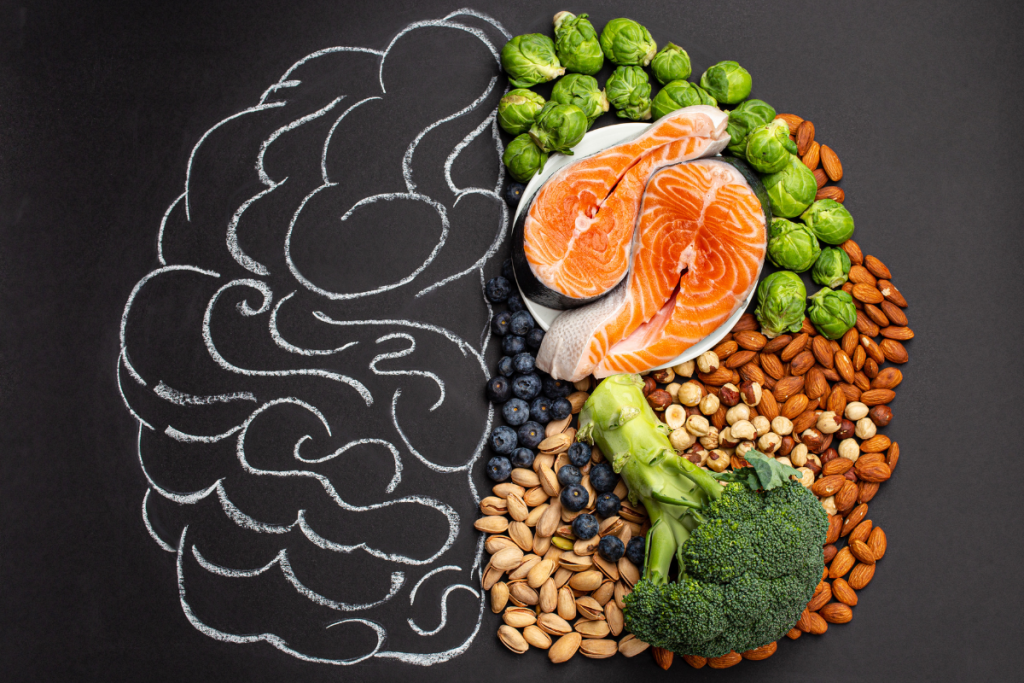

June is Alzheimer’s & Brain Awareness Month! One of the biggest complaints we find with our patients besides fatigue is brain fog or impaired cognition. Whether this is from lack of sleep, stress, food sensitivities, toxin exposure, or another root cause, the brain is an organ we cannot overlook when taking a deep look at our health journey. Give your brain a little TLC by boosting these nutrients in your diet or in your supplement regimen! Please consult your doctor before starting any new supplements.
Our brains are made up of 70% fat, so it is rightfully so that fat in our diet is very important for the brain! The right types of fat are even more important to protect neurons, cognition, and memory. Aim to have a healthy serving of omega 3 fats every day from foods such as fatty fish like sardines, salmon or herring, or add in some plant based options like algae, chia, flax, hemp, walnuts and macadamia nuts. Do your best to limit higher inflammatory fats such as canola oil, soy oil, corn oil, peanut oil, hydrogenated oils, and trans fats primarily found in processed foods.
Multitudes of research conclude that antioxidants improve oxidative stress status of brain cells, cognitive functions and motor skills by preventing free radical damage to brain cells (1). The brain is vulnerable to excessive oxidative stressors because of its fat content, high energy requirements, and weak antioxidant capacity, making antioxidants essential nutrients for total brain vitality (2). Boost foods such as berries, carrots, citrus, dark leafy greens, cherries, pomegranate, and pretty much most whole foods with rich colors!
Research is emerging showing that choline is showing effectiveness in the treatment of Alzheimer’s and other neurodegenerative diseases. Since this nutrient is needed to produce acetylcholine, an important neurotransmitter for memory, mood, muscle control, and other brain and nervous system functions, it is essential for protection of the brain. Choline also plays important roles in early brain development, making it significantly important for pregnant women (3). Choline rich foods include eggs, meat, poultry, beans, white fish, and some cruciferous vegetables.
If you have followed any functional medicine practitioner in the last 10 years, then you most likely have heard of the gut being the second brain. The more research we are doing with the gut microbiome, the more connections we are finding with good bacteria and how important it is for healthy cognition and preventing mental health issues such as anxiety and depression. One of the major pathways that the gut and brain communicate is through the vagus nerve, which often is referred to as a “communication superhighway” between the gut and the brain. There have also been many studies showing reversal of cognitive impairments associated with chronic conditions such as with obesity or insulin resistance (4). To ensure your gut and brain are communicating effectively, be sure to add in some healthy probiotic rich food sources such as yogurt, kefir, fermented vegetables, refrigerated pickles, and kimchi.
These essential mineral plays so many roles in the body and its pathways. One of the many benefits of magnesium is its neuroprotective effect. Not only does it help in protecting the nerve cells from being overstimulated and dying, but it is also greatly involved in healthy brain development, memory and learning (5). To get enough magnesium in your diet, eat foods like pumpkin seeds, legumes, nuts, leafy greens, and dark chocolate.
Get free shipping.
Free Shipping
5% Discount


At home.
Blood and Urine
$179 – $439
Depending on insurance coverage.


This is a comprehensive stool test that relies on quantitative polymerase chain
reaction (qPCR) technology to detect parasites, bacteria, H. pylori, fungi, and more by targeting the specific DNA of the organisms tested. Click here for more information.
At home.
Stool
$399
Depending on insurance coverage.


At home.
Urine
$129
Depending on insurance coverage.


At home.
Swab
$299
Depending on insurance coverage.


At home or in lab.
Blood
$999
Depending on insurance coverage.


At home.
Blood, Urine, or Ticks
may have a $200 copay
Covered by most insurance.


At home.
Urine
$300
Depending on insurance coverage.


At home.
Urine
$199
Depending on insurance coverage.


This test evaluates the genetic profile for multiple health indicators. Click here for more information.
At home
Blood Spot


At Home
Urine
$699
Fully covered by Medicare. Repeat test prices $249


$85-$225 depending on insurance coverage.




This company can test for lyme, babesia, bartonella and additional tick-borne illnesses. Click here for more information.
Blood
around $1600 (depends on panel selected)


This test is designed to look at food sensitivities (IgG immune responses). It is available in both a 99 or 184 panel. Click here for more information.
Blood
$129-238


No insurance coverage


Blood




This test evaluates the gut function and indicates microbiome balance, overgrowth, infection, inflammation, parasites and digestive efficacy. Click here for more information.
$179-$439 depending on insurance coverage.


This test evaluates many measures including micronutrients, antioxidants, minerals, detox, overview of gut function, omegas and toxic exposure. Click here for more information.
At home.
Urine
$150 – $329


Blood work for blood count, urinalysis and vitamin levels.
At any Quest Diagnostics Location
Blood
You often have to fast for these tests-please check your providers notes.




$310